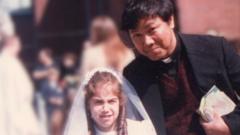Alexa MacPherson, a long-time survivor of clergy abuse, recounted her horrifying experiences that began when she was just three years old, culminating in a devastating encounter at the age of nine. Following her father's discovery of the abuse, legal proceedings aimed at justice commenced, but the Church's influence beset the case. The then-Archbishop of Boston, Bernard Law, sought to shield the accused priest, Peter Kanchong, behind veils of secrecy.
Reflecting on the crisis and the pope's legacy, Ms. MacPherson indicated that while Pope Francis made strides, many measures remain inadequate. His attempts to reform internal Church doctrines and policies have yet to prompt full transparency or accountability. She insists that for real healing to commence, the Church must expose its concealed records and hold abusive clergy accountable through legal systems, not mere ecclesiastical courts.
Amidst ongoing coverage of the Pope's death and his legacy, survivors like MacPherson lament the continued culture of silence within Church ranks, leaving many wounds unaddressed. Despite some institutional reforms initiated by Pope Francis, critics, including survivors and their advocates, argue that these actions do not go far enough toward true accountability. With the Church now preparing for new leadership, the hope for substantive change remains uncertain, as survivors continue to advocate for justice and reform.
Reflecting on the crisis and the pope's legacy, Ms. MacPherson indicated that while Pope Francis made strides, many measures remain inadequate. His attempts to reform internal Church doctrines and policies have yet to prompt full transparency or accountability. She insists that for real healing to commence, the Church must expose its concealed records and hold abusive clergy accountable through legal systems, not mere ecclesiastical courts.
Amidst ongoing coverage of the Pope's death and his legacy, survivors like MacPherson lament the continued culture of silence within Church ranks, leaving many wounds unaddressed. Despite some institutional reforms initiated by Pope Francis, critics, including survivors and their advocates, argue that these actions do not go far enough toward true accountability. With the Church now preparing for new leadership, the hope for substantive change remains uncertain, as survivors continue to advocate for justice and reform.




















